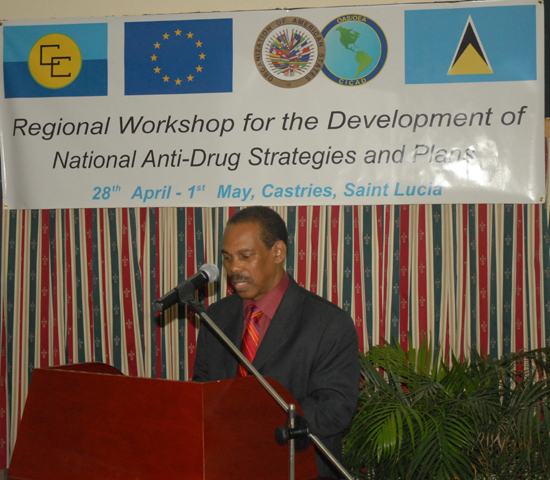 CASTRIES, SAINT LUCIA;- There is a bête noir that continues to challenge the very existence of the Caribbean's socio-economic structure.
CASTRIES, SAINT LUCIA;- There is a bête noir that continues to challenge the very existence of the Caribbean's socio-economic structure.
This bête noir or black beats has been identified at the ever increasing crime fuelled in part by the trafficking in illicit drugs and arms.
This was made reference to by the Prime Minister of Belize the Honourable Dean O. Barrow during the recent Fifth Summit of the Americas, in Port-of-Spain, Trinidad and Tobago.
The Caricom Chairman also highlighted the fact that the region has not been passive, but has taken positive steps in addressing this issue.
Addressing the opening ceremony, Dr. Edward Greene, Assistant Secretary General - Human and Social Development at the Caricom Secretariat stated, "Indeed the Community (CARICOM) has stepped up to the plate, as it were to aggressively address the problem of drug trafficking, regionally and nationally, through the establishment of a fourth pillar for Community development; that is programmes to address crime and security."
Dr. Greene further pointed out that "programmes and initiatives to address crime and security are being implemented and strengthened through the work of the Implementing Agency for Crime and Security (IMPACS)."
The delegates attending the four-day CARICOM-CICAD-EU Regional Workshop for the Development of National Anti-Drug Strategies and Plans, in Saint Lucia April 28th to May 1st 2009.
"The supply of and demand for illicit drugs are inextricably linked, and if we are to see meaningful, sustained results, we must address this phenomenon as a whole and not two disparate issues," Dr. Greene added.
"The development of national anti-drug strategy and plan is one way of marrying the two, and in this regard, the CARICOM Secretariat is pleased to be collaborating with CICAD in conducting, implementing and monitoring National Anti-Drug and Plan."
Additionally, initiatives to reduce the demand for illicit drugs and treatment of substance abusers are being strengthened, according to Dr. Greene "by in-country technical support to member states."
Such support he indicated is provided through the Technical Advisory Body for the Regional Drug Demand Reduction Strategy (RDDRS).
It is expected that the participants will take away from this week of training, "knowledge, skills and tools that will enable and guide them in effectively implementing and monitoring their own national anti-drugs strategy and plan."